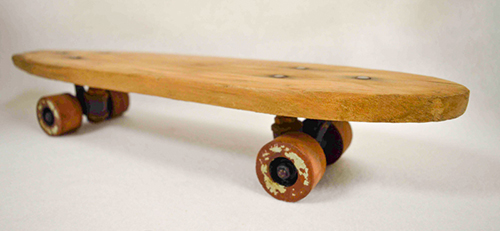
“Both my mother and my father did the best they could. You can only give the best that you know. I didn’t have a lot to draw on from my parents because they cared, but they lived during the depression and didn’t have the loving parental skills that should have been natural.
Nic Montanez, CSUSB Alumni (’94) & Retired Social Worker Redlands, CA. Nic grew up in San Bernardino, the son of two hardworking parents.
I lived on L and 7th street, just a few blocks from Mt. Vernon. It was the barrio, you know? But not as intense as it is today. It was just people of Mexican heritage that were struggling. My mother was a beautician. My father worked for the Santa Fe Railroads. Together they made pretty good money.
By the time he was 11 years old, Nic got his own job selling newspapers. He later worked as a dishwasher at La Casita, and eventually accumulated enough money to buy the skateboard on display here.
It was something I wanted and I saved up for it, and then I got it. It’s basically pretty close now to what it was originally, which was wood. But at the time I customized it – I painted the wheels blue. And I eventually put a blue carpet on it. I bought it at Sage’s toy store on E Street. It’s a gym now, I think.
At first, Nic didn’t know much about skateboarding. He loosened the wheels to do tricks, and then rode the skateboard down a partially built bridge.
That was a mistake. It was like surfing, but it was asphalt. So you fall, you get hurt. You need to have the wheels nice and tight going down. I scraped myself. I still have a big old scar.
Instead of heading home, Nic went to a friend’s house to get patched up to avoid his mother.
My mom would have yelled, ‘How could you do this stupid thing!’ She was emotionally detached. I don’t remember her hugging me, or saying, ‘I love you.’ I know she did, but she was very critical.
Nic’s mom grew up during the depression. Nic now sees this as the seed of her perfectionism.
She knew that there was a better life to live. She wanted to get there, she got there, and she wanted to stay. So she was real intense — always driving for perfection. She wanted a perfect household.
Nic inherited a bit of his mother’s perfectionism in his work ethic, and it nearly broke him – physically, and psychologically. Working as a juvenile hall group counselor he was injured when restraining a ward. When he couldn’t go back to work, he wasn’t sure his life retained any meaning.
At work, I was like a goody-goody two shoes. I was always doing my best. So on workman’s comp, I was disillusioned. I truly believed that if you couldn’t support your family, you were nothing. So I thought, ‘My life is over.’ I was going to leave my family to roam the streets, as I was no use to anyone.
With a bit of soul searching, and a degree from CSUSB, Nic found employment as a social worker in Riverside County. But, not before he had a change in attitude in his association of work with identity.
I’ve realized that no one part of your life makes up the whole of who you are. Jobs don’t make you.
Likewise, Nic recognizes that while affection was not something that he was taught, this does not mean he cannot learn it. He has consciously trained himself to express his love more overtly with his own children, and with his grandkids, than his own mother did with him.
You draw from your experiences. But just because someone hasn’t done it, doesn’t mean it’s not possible. You know? I’ve had to learn to be an affectionate person. I tried to be there for my kids. I would always make sure to take the time to be there for them, and to tell them that I loved them, and to hug them. It’s important.